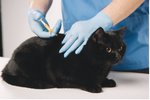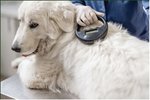

Microchips are a common form of permanent identification for both dogs and cats. Collars and rabies tags help identify your pet. But they can fall off or become difficult to read over time. Therefore, having your pets microchipped greatly increases the chances that they will be returned to you if they are lost or stolen.
A microchip is a small, electronic chip about the size of a grain of rice. Each microchip has a unique identification number that is detected when a scanner is passed over the microchip. It does not require power or a battery.
A microchip is inserted under the skin between the pet’s shoulder blades by a veterinarian. It is similar to a usual injection and does not require surgery or anesthesia. Microchipping your pet also does not change their appearance.
Microchips only contain identification numbers and are not GPS or tracking devices. If your pet is found and taken to an animal shelter or a veterinary clinic, he or she will be scanned for a microchip. A pet who has a registered microchip with updated contact information is more likely to be identified and returned to their owner. Instructions on how to register your pet’s microchip are provided when your pet is microchipped.
According to the American Veterinary Medical Association (AVMA), microchipped dogs are more likely to be returned to their owners. A research study was conducted with 7,700 stray animals at animal shelters. For example, dogs that did not have microchips were returned to their owners only 21.9% of the time. Dogs that were microchipped were returned home 52.2% of the time.
Pets may be microchipped at your local veterinarian. Chatham Animal Rescue & Education (CARE) periodically offers low-cost microchipping clinics. More information about upcoming clinics can be found by visiting chathamanimalrescue.org.
CARE also offers low-cost ($20 co-pay) spay and neuter surgeries through its program, Lillie’s Fund. The co-pay includes the surgery, pain medications, vaccines and microchipping. For an application to spay or neuter your pet, visit chathamanimalrescue.org or call 919-542-5757. Please note that until July 31st, three female pets per household may be spayed for free (no co-pays required).